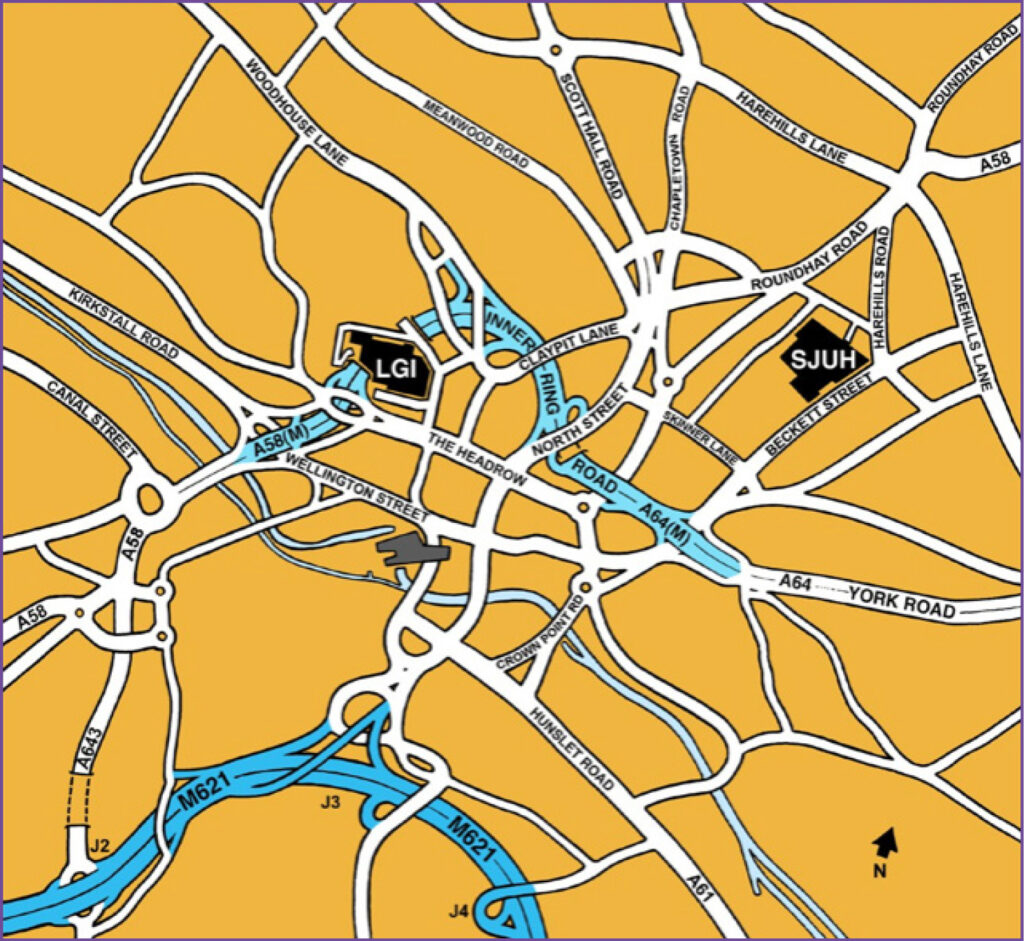This leaflet aims to help you and your family understand more about your radiotherapy treatment. It will be given to you in addition to the information you will receive from your Clinical Oncologist (who is a specialist doctor in cancer treatment).
Their team will be caring for you during your treatment. This team will include radiographers and clinical nurse specialists but may also include social workers, physiotherapists, occupational therapists, speech and language therapists and dietitians.
The leaflet describes radiotherapy planning and treatment. It also explains the side-effects which you may experience during and after treatment.
Each person’s treatment will vary, so the information given is a general guide. The healthcare team looking after you will explain your treatment and the side-effects in detail. If you have any questions after reading this leaflet, please speak to the team looking after you or ring the numbers at the end of this leaflet. Staff will make every effort to meet your individual needs or will direct you to the person who can help.
All your radiotherapy planning and treatment will take place in the Radiotherapy Department on Level -2, Bexley Wing, Leeds Cancer Centre (LS9 7TF).
Radiotherapy reception Tel: 0113 206 8940
Please do not bring any valuables into hospital with you as the Trust cannot accept liability for loss or theft.
What is radiotherapy?
Radiotherapy is the use of high energy x-rays and other types of radiation to treat cancer.
The radiotherapy causes damage to cancer cells in the treated area. Although normal cells are also affected, they can repair themselves and are able to recover. Radiotherapy is a local treatment. This means it only affects the part of the body that is treated.
Radiotherapy is used to treat lymphoma in one or two areas of the body. This can be in both early and advanced stage lymphoma.
When you are having your radiotherapy you do not feel anything and it does not make you radioactive. You may hear a buzzing noise when the machine is switched on. It is perfectly safe for you to be around others, including children and anyone who may be pregnant, throughout your treatment.
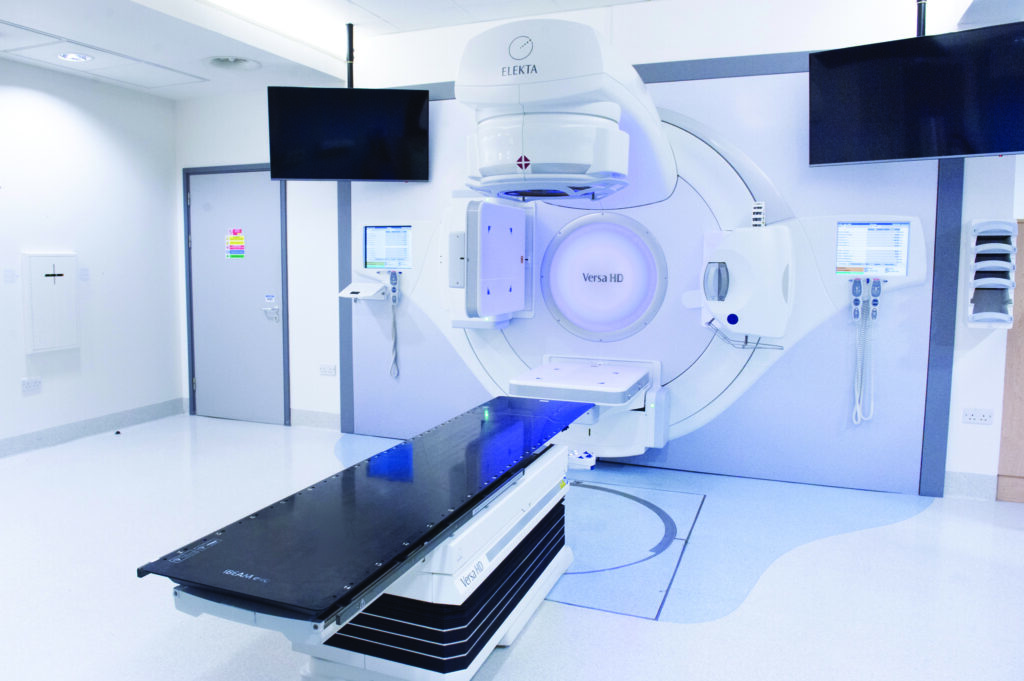
You will have your radiotherapy on a treatment machine called a Linear Accelerator as shown in the picture above. You will see your radiographers at each treatment session, and they will be happy to answer any questions you may have.
How often is it given?
Radiotherapy is usually given over one day to four weeks. This is a total of between 1-20 treatment days. Treatment is usually given daily, Monday to Friday however your treatment may not start on a Monday.
You may need to be treated on a weekend during the day due to a bank holiday and we will let you know if this is the case. Your radiographer will be able to explain the details of your individual radiotherapy appointments.
Your treatment will usually be given as an outpatient.
Visiting us before your treatment
If you would like to visit the radiotherapy department before starting treatment, please call 0113 206 7603. This visit can be very useful as you can find out more information about radiotherapy and ask questions.
Patient quote
‘I was so please to see the machines before my treatment and the staff were so helpful and really put my mind at rest.’
Who will I meet?
Therapeutic radiographers
Radiotherapy is given by therapeutic radiographers of any gender who are highly trained in the accurate planning and delivery of radiotherapy treatment. You will see your radiographers at each treatment session and they will be happy to answer any questions you may have.
Student therapeutic radiographers
The radiotherapy department is a training centre for therapeutic radiographers. They are supervised at all times. If you do not wish students to be present, please speak to a member of staff. This will not affect your treatment or care.
Important advice before your treatment
Pregnancy
It is very important that people who can become pregnant, are not pregnant at the start of a course of radiotherapy. Also, do not become pregnant during a course of radiotherapy because it can have an effect on the unborn child. Use an effective form of contraception, for example condoms, coil, depo injection or contraceptive pill.
For more information see the ‘Contraception and pregnancy during cancer treatment’ leaflet. Please do not hesitate to ask your doctor or nurse if you have any questions or concerns about these issues.
Planning your treatment
Your first appointment for radiotherapy will be a planning appointment. This will be used to gather all the information we need to accurately plan your treatment. We will contact you by phone, with an appointment for your radiotherapy planning session. Directions to the hospital and transport arrangements will be discussed with you at this point.
Some tests and scans may be needed to help plan your treatment. We will explain which of these you will need when your appointment is made. You may see your clinical oncologist (or a member of their team) at this appointment.
This is an ideal opportunity for you to ask questions. If you have not previously consented to your treatment you will be asked to sign a consent form.
What to bring with you:
- a list of all questions you may have;
- an up-to-date list of all the medications you are taking (including inhalers, sprays, vitamins or herbal products);
- any medication that you may need during your visit;
- something to eat and drink and something to occupy yourself with, as this first visit can be quite lengthy (up to two hours).
Mould Room (if you need a radiotherapy mask)
Radiotherapy involves exact positioning of the radiation beam, so you will need to stay very still while you are having treatment. The best way to help you keep still depends on which part of your head or body is to be treated. To help you stay still when treating the neck, chest or armpit areas, we make a mask for your head and shoulders.
You will be given an appointment to attend Mould Room where the masks are made.
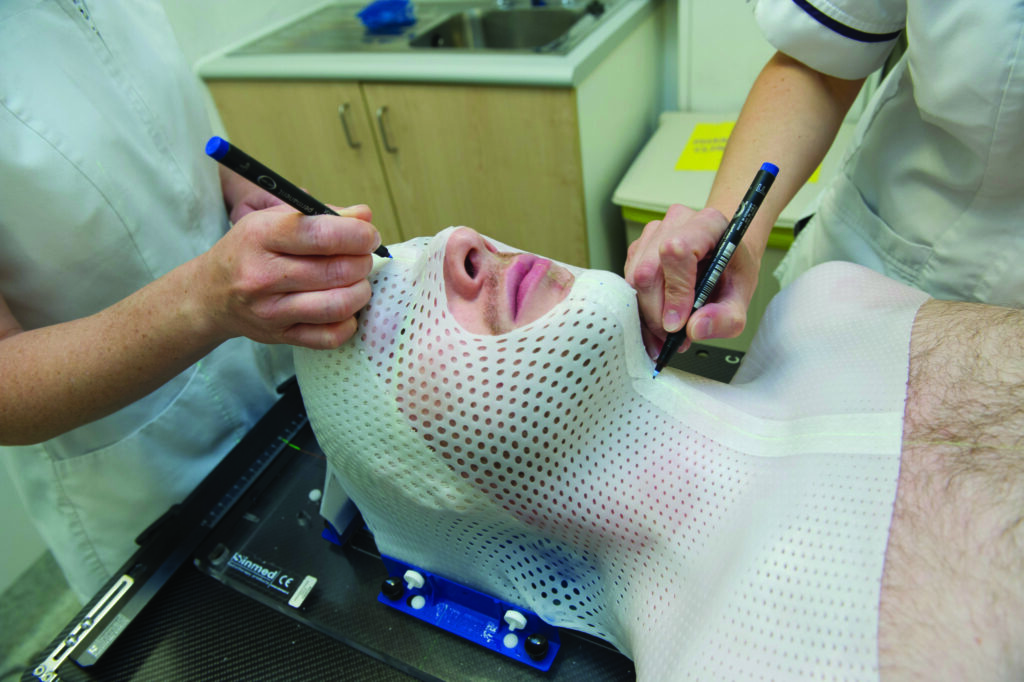
Please note: If you are having treatment to a different part of your body, a mask is not needed.
The mask is made of thermoplastic material, shown in the picture. When heated in warm water (bath temperature) the thermoplastic sheet softens.
You will be asked to lie in the position that you will be in for your treatment. The warm thermoplastic sheet is then placed over your head and shoulders and gently moulded to your shape. It gradually hardens in a few minutes and is then lifted off your face.
There are holes for your mouth and nose, so you will be able to breathe normally. As the mask must come over your chest and shoulders you will be asked to remove all clothing from the waist up. You will be given a gown to cover your chest.
If you have any concerns about the mask, please let your clinical oncologist or a member of their team know.
Your planning scan
In order to plan your treatment you will have a planning CT scan. This is done on a machine called a CT scanner, shown here in the photograph. It allows the images to be sent to the radiotherapy computer planning system.
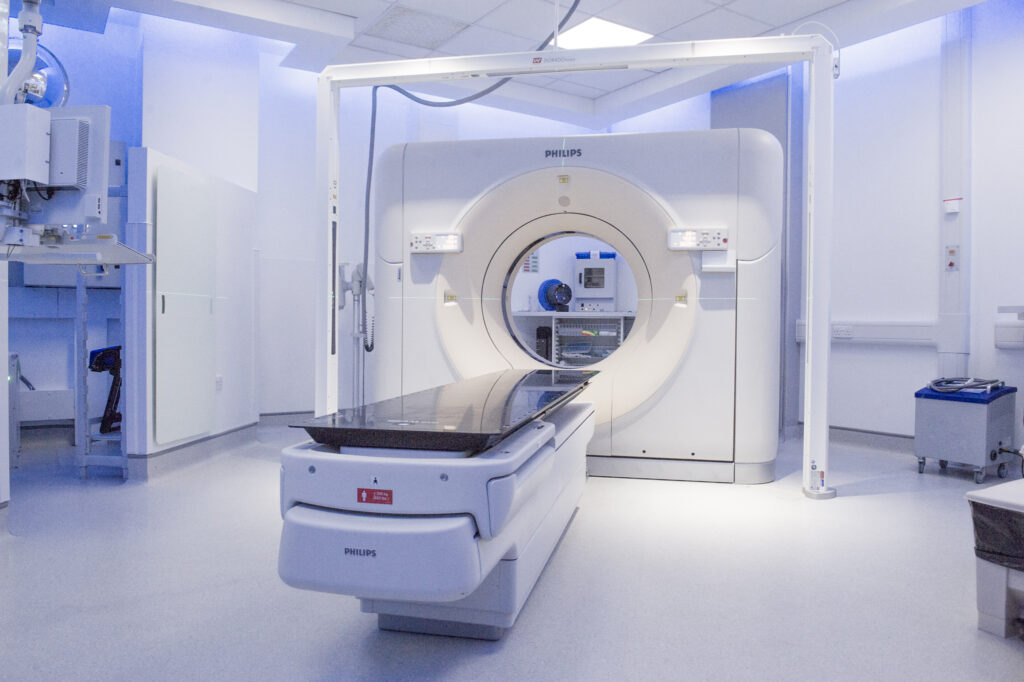
There will be several members of staff present at your scan: Therapeutic radiographers, and possibly a mould room technician and a dosimetrist (the person who will produce the computer plan for your treatment).
Planning scans are not diagnostic examinations and will not be reported on as such.
The scan will be taken with you lying in the same position as for your treatment. The radiographers will draw some marks on you, to be used as a reference for your treatment.
If a mask is needed it will be fitted and gently fixed to the small board you will be lying on. You are not fixed to the couch. The radiographers will make sure you are in the right position using laser lights. Marks will be drawn on the mask to help plan your treatment.
You will then be scanned, which will only take a few minutes and at the end of the scan the skin mark will be replaced by a small permanent mark (tattoo).
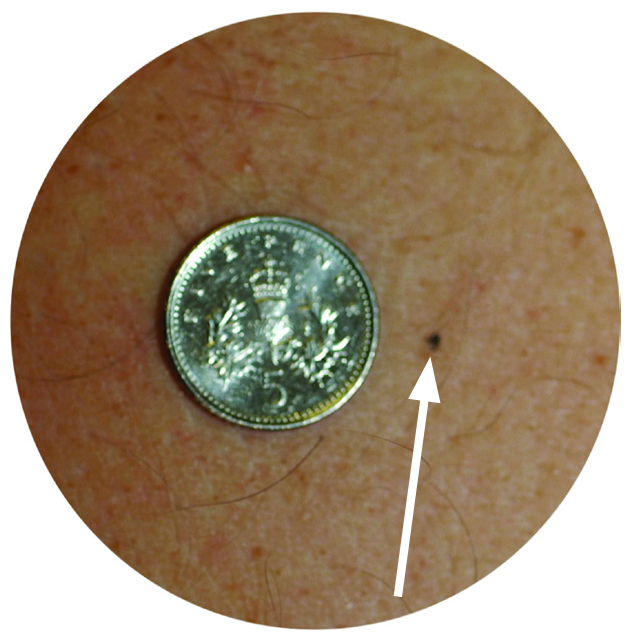
These marks will be used each day for your treatment. These permanent marks help us to reproduce your treatment with accuracy each day. It also means that you can wash without worrying about your marks coming off.
Contrast (dye)
A special contrast agent, often called a dye, may be used for your scan to make specific organs, blood vessels and/or tissue types ‘stand out’. This can make it easier for the oncologist to plan your treatment.
The dye is given through a very small plastic tube called a ‘cannula’ into a vein in your arm. You should tell the radiographer if you have any allergies, but they will go over this before they use any dye. The radiographers will advise you about drinking plenty of fluid after your injection.
Contrast side-effects
You may notice a warm feeling throughout your body and have a metallic taste in your mouth.
You may also feel as if you have passed urine. This will pass very quickly. There is a slight risk of an allergic reaction to the injection, such as a skin rash, but this very rarely leads to other complications. The staff in the radiotherapy department are highly trained to manage any complications and again the risk involved is very small. You will be able to drive your car or go to work after your scan.
Following the scan the radiographers will give you the time of your first appointment on the treatment machine. This is most likely to be a couple of weeks after the planning visit. The radiographers will talk to you about any further appointments you have.
Having your treatment
When you arrive for your treatment you should go to the radiotherapy main reception desk at the entrance of the radiotherapy department. On the first occasion you will be given a list of all your appointments. You will then be escorted to the waiting area for your machine.
The radiographers will explain what will happen and answer any questions that you may have.
Treatment is usually given daily, Monday to Friday however your treatment may start on any day of the week. Whenever possible you will be treated at the time of day that suits you, but this cannot always be arranged or guaranteed. There may be occasions when you may have a longer stay in the department or be asked to attend at a different time, for example to see your oncologist.
You may need to undress and put on a gown, the radiographers discuss this with you when you first attend the department. The radiographers will position you, and adjust the treatment couch and machine to the correct positions. For the first few treatments and also intermittently during treatment we will also take images to check the accuracy of the treatment. This will take a few more minutes.
These images do not monitor your condition but are purely for treatment accuracy.
You will be asked to stay as still as possible during the treatment but you should breathe and swallow normally.
Once you are in the correct position the radiographers will leave the room to switch on the machine. You will only be alone for a few moments at a time. The radiographers will be watching you on a closed circuit TV (CCTV) monitor during treatment.
The CCTV camera is not recording or saving any images. There is also an intercom system so the radiographers can talk to you. If you would like to listen to music during your treatment, please let us know.
The treatment only takes a few minutes but you will be in the treatment room for about 10-20 minutes. The machine stops automatically after your prescribed dose of treatment has been given. The radiographers can stop the machine at any time if needed. The treatment machine makes a buzzing sound when switched on. You do not feel anything.
The radiographers may need to come in and out part way through each treatment.
After the treatment is complete the radiographers will come back into the room and help you off the couch.
On some days the radiotherapy department may be busy and there may be a delay before your treatment.
We will keep you informed of any delays over 30 minutes, please see the delay signs in the waiting areas.
It may be a good idea to bring something to eat and drink with you, including any supplement drinks you have been asked to have and any medication you may need. There is also a restaurant and café available on Level 0.
Your treatments will generally be on the same machine, although there may be days when this machine is being serviced and your treatment will be in a different room.
Please note
It is very important that you do not miss treatment days as it may make your treatment less effective. If you feel you are unable to attend for any reason please telephone us so that we can discuss this with you. If you have any queries about your appointment times please discuss these with the radiotherapy co-ordinators on your treatment unit.
Side-effects
Side-effects can be divided into short term (acute) effects, that happen during or soon after treatment, and long term effects occurring months or years later.
Some side-effects are common, whilst others are rare. The area and amount of treatment given to you will affect which side-effects are most likely to happen to you. Your oncologist will discuss this with you. If you develop any radiotherapy side-effects you will be given advice and support by your healthcare team.
Short term side-effects from radiotherapy
Most side-effects are common and are temporary. Side-effects tend to build up from about the second week of treatment and will be at their worst at the end or just after the treatment course. They generally last a number of weeks or months after the treatment has finished.
Skin reactions
The skin in the treated area may start to redden or darken around 10 days after starting your radiotherapy. It may become dry and itchy. For a very small number of patients, it may peel and become weepy. Avoid hair removal where possible, including shaving, waxing, cream and lasers unless advised otherwise by your consultant, nurse or radiographer.
Before you start your treatment, a radiographer will explain what could happen to your skin and how to look after it. They will also give you a leaflet to take home.
If you are concerned about your skin reaction, please talk to your radiographers or contact the review clinic nursing staff in the Princess Royal Suite, telephone 0113 206 7587.
Tiredness (fatigue)
Nearly all patients having radiotherapy will feel tired. Be prepared to take things easy during treatment and allow for extra rests. Try to continue with some of your normal routines and activities if possible. If you usually work you may find this can help maintain your mood, but you may find it better to reduce your hours or take some time off.
Fatigue usually improves in the weeks to months after treatment.
Things you can do to help include:
- Gentle exercise can help reduce the symptoms of fatigue.
- Having enough to drink can prevent tiredness from dehydration.
- Small meals or snacks eaten more often than three times a day may be easier to face.
- Try to get a good night’s sleep where possible, a daytime nap may help.
- Try to ‘pace’ yourself, listen to what your body is telling you, rest if you need to.
- Pick out the things that you enjoy, and try to accept help with other tasks.
- Little and often is the rule of thumb.
There is a Macmillan information leaflet available called ‘Coping with fatigue’. If you would like a copy, or support with your fatigue please ask a member of staff.
Discomfort when swallowing
This may occur if you are having your neck or chest treated. It can start after about five treatments, and is caused by the food pipe (oesophagus) reacting to the radiotherapy. As well as difficulty swallowing you may also experience pain and heartburn (indigestion). If you experience any of these side-effects you will be given information, advice and medicines to help relieve these problems.
You should avoid very hot drinks, spicy foods. If you are eating ice cream, please do not eat it straight from the freezer, leave it 5-10 mins.
It may be 2-3 weeks after finishing treatment before your swallowing discomfort starts to settle but once it does start to improve, it usually improves rapidly. Please continue with any medicines and dietary supplements until you feel better.
Sickness
Depending on the area being treated, you may experience sickness (nausea) during the course of treatment. It is usually possible to control this with medication. Please let your radiographer or doctor know if you are feeling sick.
Bowel Symptoms
Radiotherapy to the abdomen or pelvis may irritate your bowel. It is important to tell your radiographer or nurse if you have loose motions or diarrhoea. This can be treated effectively with medication.
Occasionally people develop the urge to open their bowels (to have a poo) without passing anything (tenesmus), whilst others may find opening their bowels becomes painful. If you experience any of these difficulties please inform your radiographer, doctor or nurse.
Possible long term side-effects from radiotherapy
Long term side-effects will depend on the exact details of your treatment. If you are concerned about your risk of developing any of the following side-effects please speak to your consultant or specialist nurse.
Mouth dryness
This can occur if the salivary glands were in the area treated with radiotherapy, this may be permanent. There are products that can ease the discomfort of a dry mouth and your doctor will advise you of these.
Skin changes
Usually the skin will be quite normal in the long term after this type of radiotherapy although sometimes it can remain dry.
Occasionally the skin colour can be slightly different and the skin can develop tiny ‘spider’ veins in the skin around the treated area a year or more after treatment.
Cataracts
This will only occur if your eye is in or near the treatment area.
Underactive thyroid gland
If your thyroid gland (which is in the lower part of your neck) is close to the treated area, there may be a small risk of developing an underactive thyroid gland years later. This can cause tiredness and weight gain, amongst other symptoms. If you are worried about this please discuss it with your oncologist. If you finished treatment more than six months ago, please contact your GP who can arrange blood tests if needed.
Cancers caused by the radiotherapy
When you have had radiotherapy there is a risk that cancer can develop many years later. This is rare, however it is sensible to reduce other risk factors like avoiding smoking and sun exposure. Please discuss this with your consultant.
Heart damage
Radiotherapy can increase the risk of developing heart problems years later if your heart is in or near the treated area. It is sensible to avoid smoking and maintain a healthy lifestyle to avoid increasing this risk.
Lung damage
Radiotherapy to the lungs can cause inflammation or scarring of the lung tissues. This can occasionally cause a cough or shortness of breath. Your radiotherapy will be planned to keep this risk as low as possible.
Infertility
If the testes or ovaries are close to the area being treated there is a risk of infertility following radiotherapy. It is important to note that radiotherapy does not guarantee infertility and methods of contraception are still needed during and after radiotherapy.
You may wish to discuss sperm banking with your doctor before your radiotherapy if there is a risk of infertility from the treatment.
Hormone deficiency
If a hormone producing organ or gland receives radiotherapy, there may be risk of a hormone deficiency in the long term. This could apply to radiotherapy affecting the pituitary gland (in the brain), ovary or testes.
When treatment ends
You will have a follow-up appointment with the Leeds Lymphoma clinical oncology team. This is to make sure that any side-effects of radiotherapy treatment have settled.
This appointment can often be carried out over the telephone. Further follow-up, including any scans, will usually be arranged with the lymphoma team near your home. Please discuss this with your doctor if you have any concerns or worries.
Talking to children
You may need to talk to your children about your treatment and may not know where to begin. Talk to your doctor or visit the Information Lounge for written information. Macmillan Cancer Support have produced a booklet which will help you explain what cancer is and how it may be treated. You can also call Macmillan on 0808 808 0000 for information and advice.
Research
Leeds Cancer Centre is a major centre for research. You may be asked if you would like to help with some of the clinical studies. You are under no obligation to take part in any trials, and your treatment will not be affected in any way if you do not wish to take part.
If you do take part in a clinical trial you may meet a research nurse or radiographer who will be helping to run the trial.
Further information and support
If you have any questions please ask your hospital team. We all have our own ways of coping with difficulties. Some people have a close network of family and friends who provide emotional support. Others would rather seek help from people who are not involved with their illness.
The following are also available as sources of information and support that you may wish to use.
Clinical Nurse Specialists (CNS)
Your CNS, often called your ‘key worker’, is available to discuss any aspect of your treatment with you. You will be seen by a CNS before your treatment. This is to offer support and advice about the practicalities and effects of your treatment and answer any questions you may want to ask.
Your CNS might be based in your local hospital so may not be in Leeds Cancer Centre. If you need CNS support while in Leeds the CNS team here are happy to help.
Your CNS will also assess and discuss any physical, psychological, social, occupational and spiritual needs that you may have. They can refer you to other services if needed, for instance, benefits advice.
Macmillan Specialist Radiographer and Macmillan Radiotherapy Nurse Specialist
Sometimes people need more help if they are feeling depressed, very anxious or are having problems with their treatment or accepting their diagnosis. If this is the case you may benefit from seeing the Macmillan radiographer or nurse specialist. Your oncologist, radiographer or nurse can refer you at any point before or during your treatment.
Local Support Services
Leeds Cancer Support
Leeds Cancer Support complements care provided by your clinical team. We offer access to information and a wide range of support, in a welcoming environment for you, your family and friends.
We can be found in the information lounges in Bexley Wing and also in the purpose built Sir Robert Ogden Macmillan Centre (behind the Thackray Medical Museum).
The Sir Robert Ogden Macmillan Centre
This centre offers a variety of free health & wellbeing and supportive therapies for patients, their family members and carers. These include hypnotherapy, mindfulness coaching, acupuncture (for hot flushes) and pilates.
Contact numbers for Leeds Cancer Support
National Support Organisations
Hotel Bexley Wing
The hotel is located on the 8th floor of Bexley Wing and offers 19 twin rooms and 1 single room. All have en-suite, tea and coffee making facilities, a mini fridge, towels, hairdryer and digital television. There are two rooms with wheel chair access and a wet room.
Patients are able to stay free of charge. There is a charge for relatives if they are staying in their own room. There are no cooking facilities in the hotel.
Meals can be purchased (at breakfast and lunch) if you are able to make your way to the restaurant in the Bexley atrium.At other times you will need to have something you have brought from home or purchased.
There is no staff after 4pm until the next morning in this facility.
For further details please contact the Hotel Co-ordinator on 0113 206 7687.
Out of hours please contact the Non-Surgical Oncology Nurse Practitioner through main switch board on 0113 243 3144.
Car Parking
When you are coming for radiotherapy planning and treatment your parking is free in the on-site multi-storey car park.
Please ask for more information at the radiotherapy main reception desk.
St James’s University Hospital site plan
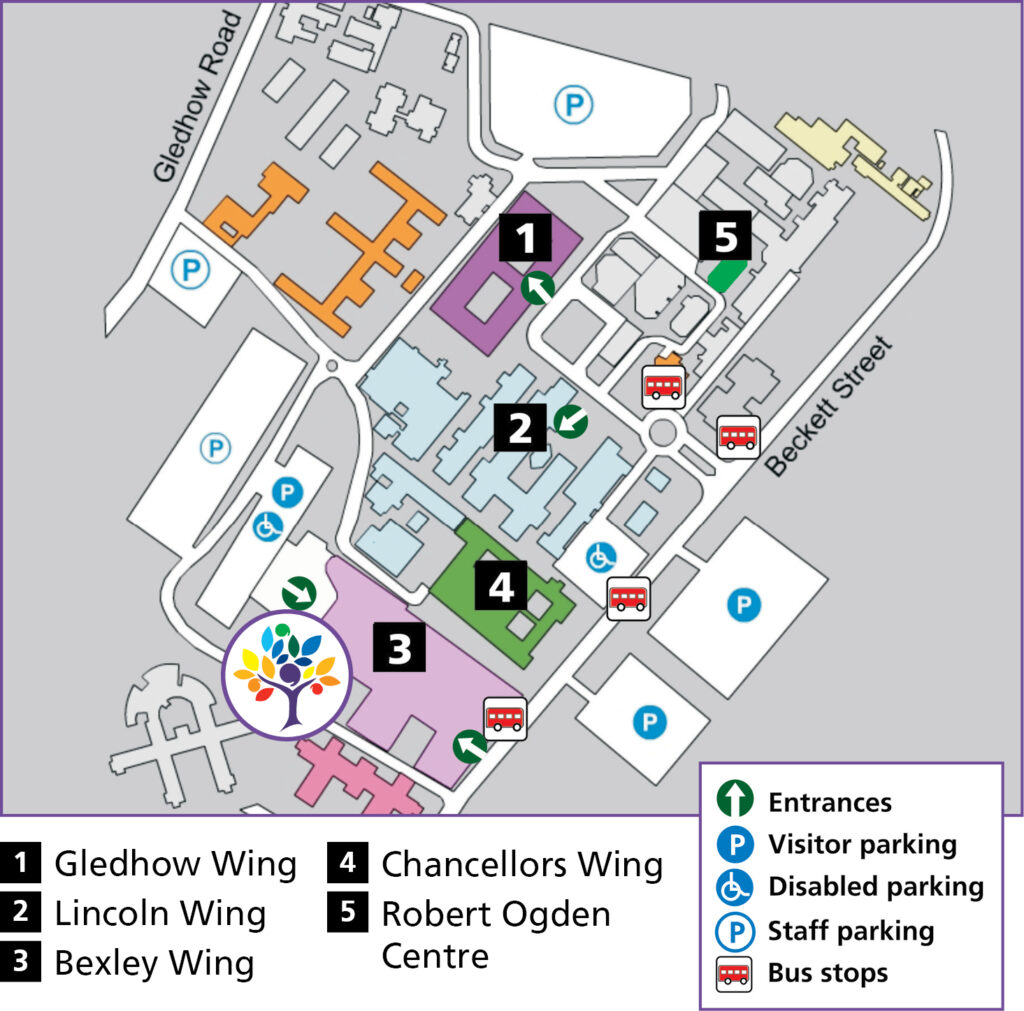
Map of Leeds showing Leeds General Infirmary (LGI) and St James’s University Hospital (SJUH)
